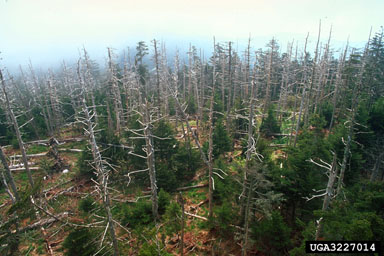 Our Forest Our Forest
Once there was a forest as grand and as mythical a
forest as you can image. It stretched from the Atlantic coast to the
Mississippi river. An ancient forest with trees whose diameter was usually over
5 feet up to giants with diameters of 10 feet. Moss covered the feet of the
trees, whose root where so large that the ground was raised several feet in the
air before you got to the trunk. They reached up to a canopy of leaves hundreds
of feet in the air, looking like a cathedral. This forest was one of the oldest
and most complex forest on earth. Animals such as elk, deer, bison, mountain
lions, black bears, and wolves roamed the forest floor...
A mythic vision from a fantasy novel? No, this one really existed and was only
destroyed relatively recently. Here in the southern Appalachian mountains, this
primeval forest survived until the late 19th and early 20th centuries. Now many
of the inhabitants and visitors to this area, know nothing about it. Or at least don't
think about what was on their property less than 100 years ago. My grandparents
and great grand parents could remember.
All the forests in western North Carolina that you see today are probably only
80 years old or less, only a few young saplings compared to what once was. Here
at the Ranch the forest was totally logged, first in the early 1900s and then
for the second time in the 1950s. All the woods here today are at most 50 years
old. Many places were pasture only 15-20 years ago.
We are fortunate to live in an area where a significant portion of the land
around us is protected from development. Haywood County contains a section of
the Great Smoky Mountain National Part, the Shining Rock Wilderness Area, and
the Pisgah (pronounced piz-gah) National Forest. Thanks to this, inhabitants of
our area, especially the Ranch which is surrounded on all four corners by the
Pisgah National Forest including a bear sanctuary, are still aware of the
forest around them.
 Tree
Extinction Tree
Extinction
This is not a pleasant subject and there is not much we can do to stop it.
You hear many stories of saving the biodiversity of the Amazon rain forest, but
you rarely hear of what we have already lost and are still losing here in the
eastern US. Go to this page to read of what we've lost and what we're doing
about it
|

 Our Forest
Our Forest